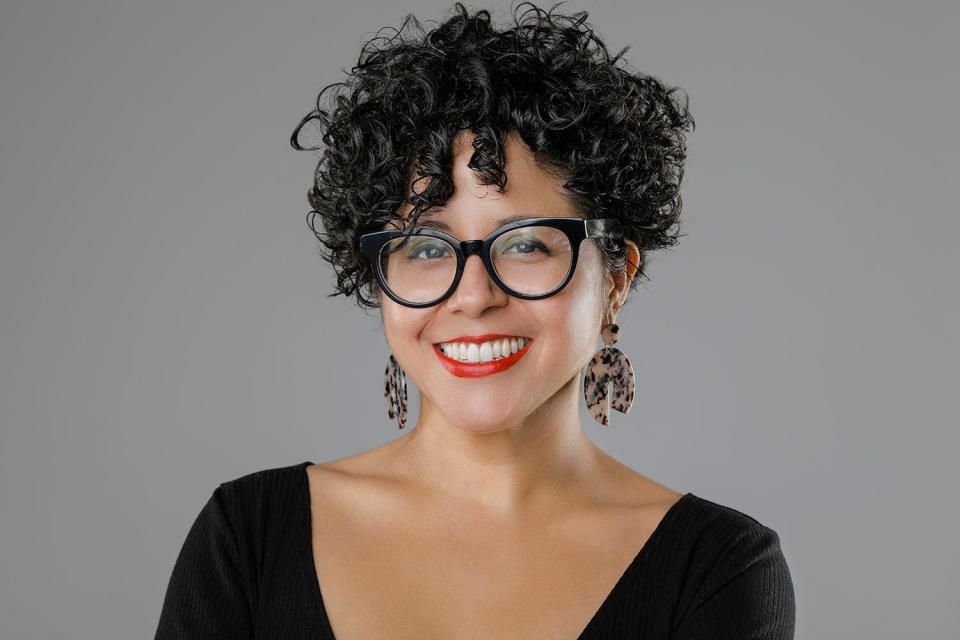Painting a world in which women, migrants have more power
I am the child of first-generation immigrants, and I grew up in Oakland, California, in the 1980s and '90s, when Oakland was one of the most dangerous cities in the country.
Oakland was the home of the Black Panthers, and the powerful remnants of the Black power movement remained alive in my city even while my neighborhood was being ravaged by the war on drugs, mass incarceration and gangs. My parents taught me the importance of creating something out of nothing. I was always a creative child; art allowed me to create another world for myself in my imagination, where I could be seen in my full humanity.

My experiences also taught me that I could tap into the power of art and culture to bring about lasting social change.
I work on climate issues because I grew up in a polluted community. I experienced sexism my entire life, including dealing with machismo in my family, and so today I organize for gender equity. I work toward racial justice because I grew up in an Afro Latino family, in a Black and brown neighborhood that was largely neglected by the state. I had very poor sex education in my school, so today I organize for reproductive justice and comprehensive sex education for young people.
I began my activism when I was 16 years old, organizing for more funding for my school and less funding for prisons. I was active in speaking out for racial justice and fighting against anti-immigrant sentiment. I learned to exercise my voice and realized that my leadership skills were strong and that I had the power to inspire others. I also had the ability to create with my hands. In addition to organizing meetings and protests, I also made posters on my mom’s office copy machine and hung them up all over my high school.
The most important thing I do is organize artists, because our creativity is our superpower. Culture and our imaginations can shape political and economic systems. When we share our stories, we can change the world. We witnessed this in the MeToo and Black Lives Matter movements, both of which are transforming and influencing our national dialogue.
I partnered with director Joey Soloway to create 5050by2020, as part of the MeToo and Time's Up movements. I'm among many artists working to ensure more equitable leadership roles for women and other minority groups in Hollywood (where 96% of movie directors are men).
Our most recent accomplishment? The creation of fellowships supporting emerging screenwriters from marginalized identities, including undocumented migrants.
Nearly a decade ago, I gathered with more than 50 artists who cared about social justice to plant the seed for the organization of my dreams, which is known as the Center for Cultural Power.
At my organization, we build cultural power, not just diversity, representation or cultural equity — but infrastructures that build power for the most marginalized and excluded people in our country. We understand cultural power to be the ability for people to see themselves reflected in stories, art and culture, and, collectively, to impact and shape worldview.
People of color make up a tiny fraction of the cultural sector, evidence that institutional and systemic racism still exists in the arts. The culture around us is absolutely not reflective of what this country looks like.
If there was ever a moment for art, it is now. As the country barrels toward the 2020 presidential election, white nationalism, fear, hostility and scapegoating feel stronger than ever.
We are witnessing the failure of our systems and the devastating impacts of negative structures on people and the planet. The consequences of underinvesting in the social safety net, in our schools and our health care infrastructure, have never been more clear. With this fracture comes an opportunity to unite behind shared values that steer us toward a new worldview based on collaboration, collective wellness and interconnectedness.
The work of artists and cultural workers is critical to shape the worldview that our people and planet need in the age of a pandemic. As the crisis unfolds and our losses overwhelm us, artists will help us process our grief and imagine a pathway forward.
Artists can paint a picture of a new normal that will allow us to wake up to a better version of ourselves and our communities, where justice and compassion are possible, where we value each other and build a social safety net that can hold us all and where we live in regenerative relationships with each other and with the Earth.
Favianna Rodriguez is an artist and activist based in Oakland, California.
Leaders of Change
Overview: A mayor, a filmmaker, a Navajo Nation president: Our take on Leaders of Change
Social and Criminal Justice:We allow 'the most marginalized among us to be exploited'
Policing reform: 'There’s so much at stake, but we were built for this moment'
Politics: ‘We're holding our prosecuting offices responsible’
Economy: 'When people have the resources to help themselves, they are going to'
Education: 'Black girls were experiencing harm ... beyond the rate of the boys'
Children's rights: 'We must redress racial inequality for children'
Health care: 'Unnamed wound is what I have come to understand as racial trauma'
Environment: ‘No community should be saddled with more environmental burdens’
Religion: 'Neighbors who did not understand neighbor love'
This article originally appeared on USA TODAY: Painting a world in which women, migrants have more power

